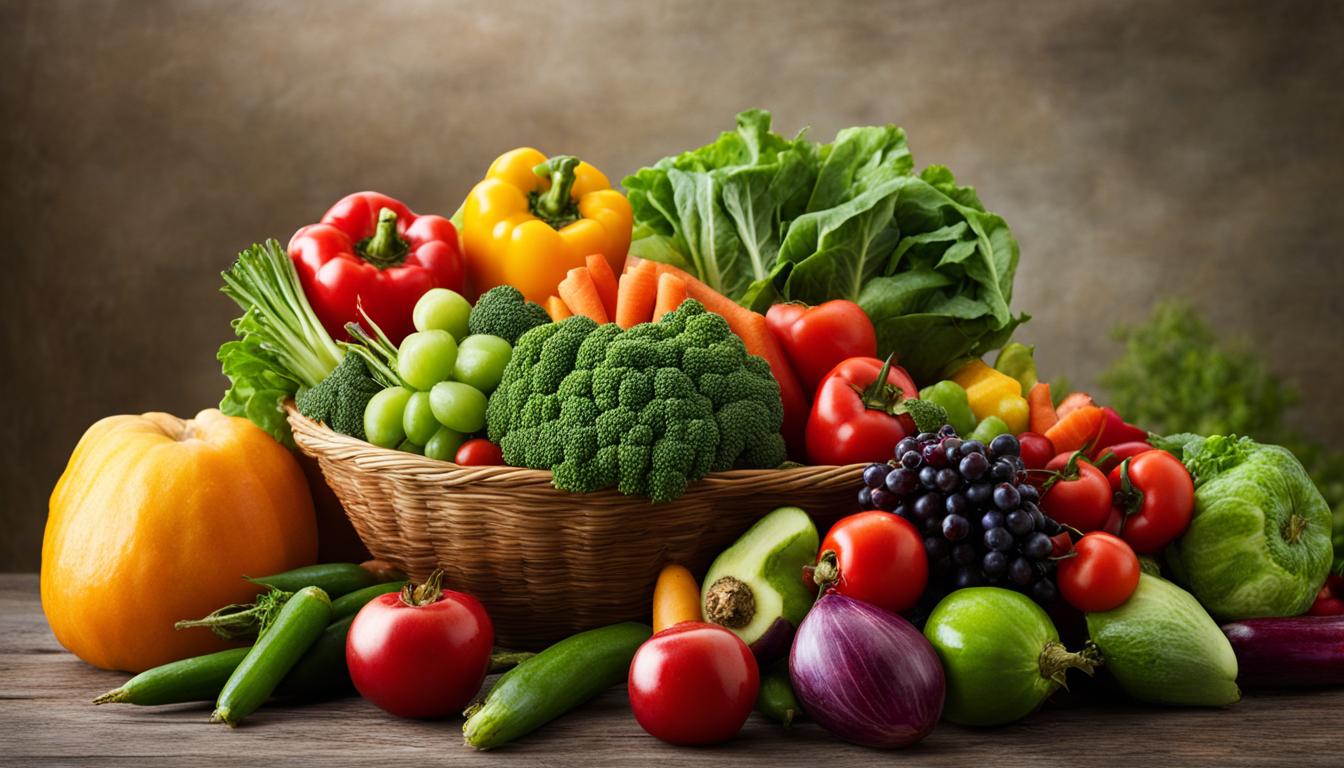Are you considering a plant-based diet? Going plant-based means adopting a vegan lifestyle that prioritizes nutrient-rich, sustainable foods. Not only does this dietary choice offer a wide range of nutritional benefits, but it also promotes environmental stewardship. Transitioning to a plant-based diet requires careful planning and a consideration of key nutrients. In this article, I will guide you through the process and provide valuable insights for a successful transition.
Key Takeaways:
- A plant-based diet can lower the risk of cardiovascular diseases and improve digestion.
- Transitioning to a plant-based diet requires planning for key nutrients like protein, calcium, iron, omega-3 fatty acids, and vitamins B12 and D.
- Meal planning and stocking your kitchen with plant-based alternatives are essential for a successful transition.
- Gradual changes and mindful choices help in embracing the new flavors and recipes of a plant-based diet.
- Consider supplements to ensure nutritional adequacy and consult with a healthcare provider or registered dietitian for personalized guidance.
- Building a supportive community of like-minded people can provide motivation and inspiration.
Planning Your Meals for a Successful Transition
When transitioning to a plant-based diet, meal planning plays a crucial role in ensuring a smooth and successful transition. By creating a weekly meal plan and stocking your kitchen with the right ingredients, you can make the process easier and more enjoyable.
Meal Planning:
- Start by creating a weekly meal plan that includes a variety of plant-based recipes. This will help you stay organized and ensure that you have all the necessary ingredients on hand.
- Take some time to research and find simple recipes that align with your taste preferences. Look for dishes that are easy to prepare and incorporate familiar flavors.
- Pro tip: Experiment with different cuisines and flavors to keep your meals exciting and diverse.
Stocking Your Kitchen:
- When transitioning to a plant-based diet, it’s important to have a well-stocked kitchen that includes plant-based proteins, non-dairy alternatives, and basic seasonings.
- Make sure to have a variety of plant-based proteins such as beans, lentils, chickpeas, tofu, and tempeh. These options provide ample protein and can be used in a wide range of recipes.
- Pro tip: Explore different non-dairy alternatives like almond milk, oat milk, and coconut milk. These can be used as substitutes in various recipes, including smoothies, soups, and baked goods.
- Keep your pantry stocked with basic seasonings like herbs, spices, and condiments. These ingredients will enhance the flavors of your plant-based meals and make them even more delicious.
By planning your meals and stocking your kitchen with plant-based essentials, you’ll set yourself up for success on your journey to a plant-based lifestyle.

Sample Weekly Meal Plan
| Day | Breakfast | Lunch | Dinner | Snack |
|---|---|---|---|---|
| Monday | Green smoothie bowl | Quinoa salad with roasted vegetables | Vegan stir-fry with tofu and mixed vegetables | Apple slices with almond butter |
| Tuesday | Oatmeal with berries and nuts | Chickpea salad sandwich with avocado | Spaghetti with marinara sauce and lentil “meatballs” | Cucumber slices with hummus |
| Wednesday | Avocado toast with sprouts | Black bean and quinoa burrito bowl | Vegan cauliflower buffalo wings with a side of sweet potato fries | Trail mix |
| Thursday | Vegan banana pancakes | Spinach and strawberry salad with balsamic dressing | Portobello mushroom burgers with roasted veggies | Energy balls |
| Friday | Chia seed pudding with mixed berries | Veggie wrap with hummus | Coconut curry with tofu and vegetables | Carrot sticks with tahini dip |
Remember, meal planning is key to a successful transition to a plant-based diet. With a well-thought-out meal plan and a stocked kitchen, you’ll be able to enjoy delicious and nutritious plant-based meals with ease.
Gradual Transition and Mindful Choices
When it comes to transitioning to a plant-based diet, going cold turkey may not be the most effective approach. Instead, it is recommended to make gradual changes that allow your body and taste buds to adjust at a comfortable pace. By taking small steps towards adopting a plant-based lifestyle, you can increase the likelihood of long-term success and enjoyment.
Start by substituting a few meals a week with plant-based alternatives. This allows you to explore new flavors and experiment with different recipes without completely eliminating familiar dishes. Gradually increase the number of plant-based meals in your everyday schedule as you become more comfortable with the new dietary choices.
A key aspect of the gradual transition is focusing on familiar flavors. Swap animal-based ingredients with plant-based alternatives that provide similar tastes and textures. For example, replace ground beef with lentils in your favorite homemade chili or use tofu as a substitute for scrambled eggs. This way, you can still enjoy the familiar flavors you love while embracing a more plant-centric diet.
Patience is crucial during the transition process. It takes time for your taste buds and body to adapt to new foods and flavors. Be patient with yourself and allow room for adjustment. Discovering and trying out new plant-based recipes can be an exciting journey of culinary exploration. Embrace the process and approach it with a sense of curiosity and adventure.
“A gradual transition to a plant-based diet offers numerous benefits. It allows your body to adapt slowly, reduces the chances of feeling deprived, and increases the likelihood of long-term success.”– Nutritionist Emma Jones
By making gradual changes and approaching the transition with a mindful mindset, you can seamlessly incorporate more plant-based options into your diet. Enjoy the process of discovering new flavors and experimenting with different recipes. Remember, the goal is not perfection but progress towards a more sustainable and health-conscious lifestyle.
Ensuring Nutritional Adequacy
When transitioning to a plant-based diet, it’s important to ensure that you’re getting all the necessary nutrients to maintain good health. While a balanced and diverse plant-based diet can provide most of the essential nutrients, some supplements may be needed to fill any gaps and prevent nutrient deficiencies.
One important supplement to consider is vitamin B12. This vitamin is mainly found in animal products, so it can be challenging to obtain enough from plant-based sources alone. Taking a vitamin B12 supplement or consuming fortified foods can help meet your body’s needs and prevent deficiencies.
In addition to vitamin B12, it’s crucial to focus on achieving a balanced and diverse diet. This means including a variety of fruits, vegetables, whole grains, legumes, nuts, and seeds in your meals. It’s also essential to pay attention to other nutrients like iron, calcium, omega-3 fatty acids, and vitamins D and K2.
Consulting with a healthcare provider or registered dietitian is highly recommended to determine your specific nutrient needs and ensure you’re taking the right supplements. These professionals can assess your current diet, identify any potential nutrient deficiencies, and provide personalized recommendations to support your transition to a plant-based lifestyle.
| Nutrient | Sources | Recommended Daily Intake |
|---|---|---|
| Iron | Dark leafy greens, legumes, fortified cereals | 8-18 mg |
| Calcium | Tofu, fortified plant-based milk, leafy greens | 1000-1300 mg |
| Omega-3 fatty acids | Flaxseeds, chia seeds, walnuts | 250-500 mg |
| Vitamin D | Sunlight, fortified plant-based milk, mushrooms | 600-800 IU |
| Vitamin K2 | Natto, fermented soy products | 90-120 mcg |
Remember that supplements should not replace a balanced diet but rather complement it. They can be an effective way to ensure you’re meeting your nutritional needs, especially during the transition period. By combining a well-planned plant-based diet with the right supplements, you can enjoy the benefits of a plant-based lifestyle while maintaining excellent nutrition.
Building a Supportive Community
Transitioning to a plant-based lifestyle is an exciting journey that becomes even more fulfilling when you connect with like-minded individuals. Surrounding yourself with a supportive community can make the transition easier and more enjoyable.
One of the best ways to foster a sense of community is by sharing meals with others who follow a plant-based lifestyle. Whether it’s a potluck dinner, a cooking club, or simply gathering with friends, the experience of enjoying plant-based meals together can be immensely gratifying.
Consider joining local or online communities dedicated to the plant-based lifestyle. These communities provide a space where you can connect with others, gain valuable insights, and share your own experiences. Attending plant-based events, such as food festivals or cooking workshops, is another great way to meet like-minded individuals who are passionate about the same values and interests.
Seek support from friends and family members who are understanding and supportive of your dietary choices. Having their encouragement and understanding can provide the motivation and inspiration needed to sustain your plant-based lifestyle in the long run.
Remember, every small step towards embracing a plant-based diet makes a significant difference for both your health and the environment. By building a community of like-minded individuals, sharing meals, and embracing a plant-based lifestyle together, we can create a positive impact on our own lives and the world around us.
FAQ
What are the benefits of a plant-based diet?
A plant-based diet has numerous benefits, including lower risk of cardiovascular diseases, improved digestion, and increased fiber intake. It is also a sustainable choice that reduces greenhouse gas emissions and promotes environmental stewardship.
How do I plan my meals when transitioning to a plant-based diet?
Planning your meals is crucial when transitioning to a plant-based diet. Start by creating a weekly meal plan and going grocery shopping for necessary ingredients. Look for simple recipes and stock your kitchen with plant-based proteins, non-dairy alternatives, and basic seasonings to make cooking easier and more enjoyable.
Should I make a sudden shift or transition gradually when adopting a plant-based diet?
It is recommended to make gradual changes when transitioning to a plant-based diet. Start by substituting a few meals a week and gradually increase the number of plant-based meals in your everyday schedule. Focus on increasing the portion of salads and decreasing the portion of meat. Swap animal-based ingredients with plant-based alternatives to develop a taste for the new diet.
Do I need to take supplements when following a plant-based diet?
Shifting to a plant-based diet may require additional supplementation to ensure you’re getting all the necessary nutrients. Consider taking supplements like vitamin B12, which is mainly found in animal products. While it is possible to obtain most nutrients through a balanced and diverse plant-based diet, certain supplements can help fill any gaps and support overall health and well-being. It is recommended to consult with a healthcare provider or registered dietitian to determine your individual nutrient needs.
How can I build a supportive community when adopting a plant-based lifestyle?
Surrounding yourself with like-minded individuals can make the transition to a plant-based diet easier and more enjoyable. Connect with others who follow a plant-based lifestyle and share meals together. Join local or online communities, attend plant-based events, and seek support from friends and family members who are supportive of your dietary choices. Having a supportive community can provide motivation, inspiration, and valuable resources for maintaining a plant-based lifestyle in the long run.




